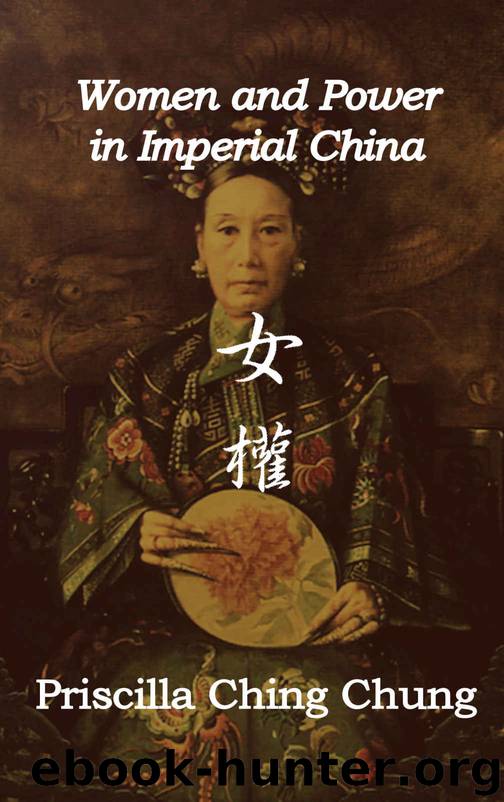Women and Power in Imperial China by Priscilla Ching Chung

Author:Priscilla Ching Chung [Ching Chung, Priscilla]
Language: eng
Format: azw3, epub
Publisher: UNKNOWN
Published: 2016-08-31T04:00:00+00:00
Marriage Policy
The Liao practiced a unique marriage policy in which the imperial clan could only intermarry with a special clan, the consort clan. This was established by the founding emperor in appreciation of the support of his wife and her family in the founding of a new dynasty. The imperial clan, the Yelu, would only take wives from the founding emperor’s wife’s Xiao clan. So the Yelu and the Xiao clan intermarried with each other. The Yelu men would take Xiao brides and the Xiao men would take Yelu brides. This way, the power remained in the hands of these two clans. Ideally, the empress would come from the dominant Xiao clan, a descendant from the father of the founding empress. The third Liao emperor wanted to weaken the power of the lineage of the founding empress and to broaden the base of the consort clan. He named a Chinese woman as his empress and as a result he faced a rebellion. He was forced to take another Xiao woman as empress; he refused to demote his original empress and instead had two empresses. He gave the name of Xiao to groups loyal to him and these adopted persons were encouraged to marry into the highest Yelu lineages, including the imperial line. This strategy did not survive his death and the lineages of the honorific Xiao families became unimportant and power continued to reside in the hands of the original Xiao families.8
Download
Women and Power in Imperial China by Priscilla Ching Chung.epub
This site does not store any files on its server. We only index and link to content provided by other sites. Please contact the content providers to delete copyright contents if any and email us, we'll remove relevant links or contents immediately.
| Anthropology | Archaeology |
| Philosophy | Politics & Government |
| Social Sciences | Sociology |
| Women's Studies |
The Rules Do Not Apply by Ariel Levy(4957)
On the Front Line with the Women Who Fight Back by Stacey Dooley(4859)
The Lonely City by Olivia Laing(4798)
Bluets by Maggie Nelson(4547)
The Confidence Code by Katty Kay(4251)
Three Women by Lisa Taddeo(3422)
Not a Diet Book by James Smith(3409)
Inferior by Angela Saini(3311)
Confessions of a Video Vixen by Karrine Steffans(3301)
A Woman Makes a Plan by Maye Musk(3247)
Pledged by Alexandra Robbins(3170)
Wild Words from Wild Women by Stephens Autumn(3148)
Nice Girls Don't Get the Corner Office by Lois P. Frankel(3034)
Brave by Rose McGowan(2817)
Women & Power by Mary Beard(2767)
Why I Am Not a Feminist by Jessa Crispin(2747)
The Clitoral Truth: The Secret World at Your Fingertips by Rebecca Chalker(2709)
The Girl in the Spider's Web: A Lisbeth Salander novel, continuing Stieg Larsson's Millennium Series by Lagercrantz David(2709)
I Who Have Never Known Men by Jacqueline Harpman(2625)
